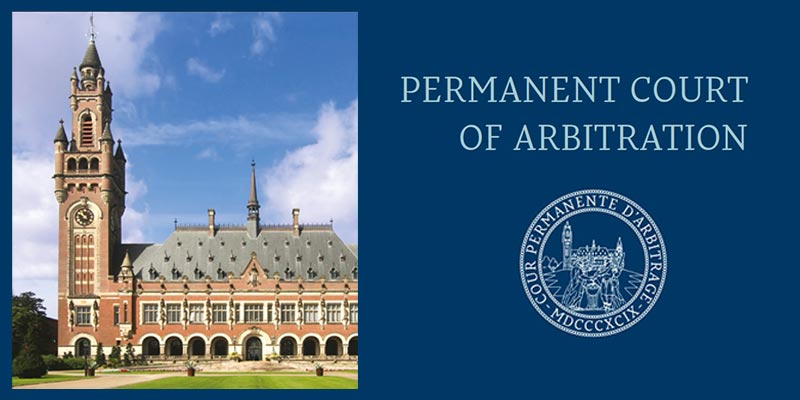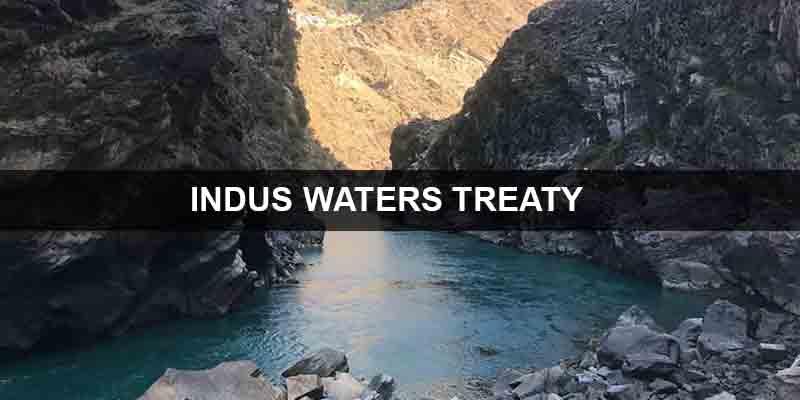- India
- Jun 28
- Sreesha V.M
India rejects Permanent Court of Arbitration’s ruling on Indus Waters Treaty
India strongly rejected a ruling by the Permanent Court of Arbitration in The Hague over two hydroelectric projects in Jammu & Kashmir, saying it has never recognised the so-called framework for dispute resolution with Pakistan under the Indus Waters Treaty.
What is Indus Waters Treaty?
• India and Pakistan share the waters of six rivers — Ravi, Beas, Sutlej, Indus, Chenab and Jhelum.
• The basin is mainly shared by India and Pakistan with a small share for China and Afghanistan.
• The Indus Waters Treaty was signed in 1960 after nine years of negotiations between India and Pakistan with the help of the World Bank, which is also a signatory.
• Under the Treaty, the water from the three eastern rivers — Ravi, Sutlej and Beas — averaging around 33 million acre feet (MAF) were allocated to India for exclusive use.
• The water from western rivers — Indus, Jhelum and Chenab — averaging to around 135 MAF were allocated to Pakistan except for specified domestic, non-consumptive and agricultural use permitted to India as provided in the Treaty.
• The Treaty also sets forth distinct procedures to handle issues which may arise: “questions” are handled by the Commission, “differences” are to be resolved by a Neutral Expert, and “disputes” are to be referred to a seven-member arbitral tribunal called the “Court of Arbitration.”
• As a signatory to the Treaty, the World Bank’s role is limited and procedural.
• The Treaty sets out a mechanism for cooperation and information exchange between the two countries regarding their use of the rivers, known as the Permanent Indus Commission (PIC), which has a commissioner from each country.
• The two commissioners are required to meet at least once every year, alternately in India and Pakistan.
Dispute over two hydroelectric power plants
• The disagreement between India and Pakistan concerns the design features of the Kishanganga (330 MW) and Ratle (850 MW) hydroelectric power plants.
• The two countries disagree over whether the technical design features of these two hydroelectric plants contravene the Treaty.
• The plants are located in India on tributaries of the Jhelum and the Chenab Rivers. The Treaty designates these two rivers, as well as the Indus, as the “Western Rivers” to which Pakistan has unrestricted use with some exceptions. Under the Treaty, India is permitted to construct hydroelectric power facilities on these rivers.
• In 2015, Pakistan requested the appointment of a Neutral Expert to examine its technical objections to India’s Kishenganga and Ratle hydroelectric projects.
• In 2016, Pakistan unilaterally retracted this request and proposed that a Court of Arbitration adjudicate on its objections.
• Under the pact, any difference needs to be resolved under a three-stage approach.
• In November 2016, India had pointed out the legal untenability of the World Bank launching two simultaneous processes for appointment of a neutral expert — requested by India, and establishment of a Court of Arbitration — requested by Pakistan on Kishenganga and Ratle hydroelectric projects.
• In March 2022, the World Bank announced starting the two concurrent processes and subsequently, appointed a Neutral Expert and a chair of the Court of Arbitration.
• When the two concurrent processes resumed in March 2023, India only cooperated with the Neutral Expert and has been skipping the process being followed by the Court of Arbitration.
• In July 2023, Court of Arbitration ruled that it has the competence to consider matters concerning the Kishenganga and Ratle hydroelectric projects.
• While India refused to take part in the Court of Arbitration, it submitted a Memorial to the Neutral Expert in August 2023.
The Permanent Court of Arbitration
• The Permanent Court of Arbitration (PCA) is an intergovernmental organisation established by the 1899 Hague Convention on the Pacific Settlement of International Disputes.
• It provides a variety of dispute resolution services to the international community.
• The PCA has 125 Contracting Parties.
• Headquartered at the Peace Palace in The Hague, the Netherlands, the PCA facilitates arbitration, conciliation, fact-finding, and other dispute resolution proceedings among various combinations of States, State entities, intergovernmental organisations, and private parties.
What PCA said in its later order?
• A day after the April 22 Pahalgam terror attack, India took a series of punitive measures against Pakistan that included putting the Indus Waters Treaty of 1960 in “abeyance”.
• On June 27, the Court of Arbitration rendered a Supplemental Award on the Competence of the Court in an arbitration initiated by Pakistan against India pursuant to Article IX and Annexure G of the Indus Waters Treaty.
• In these proceedings, Pakistan requested the Court of Arbitration to address the interpretation and application of the Indus Waters Treaty to certain design elements of the run-of-river hydro-electric projects that India is permitted by the Treaty to construct on the tributaries of the Indus, Jhelum, and Chenab, before those rivers flow into Pakistan.
• The Court found that India’s position on “abeyance” of the Treaty does not limit the competence of the Court over this dispute, which the Court previously affirmed in its Award on Competence of July 6, 2023.
Why India rejects PCA's ruling?
• The Ministry of External Affairs (MEA) said India rejects this so-called “supplemental award”, referring to the ruling in the case related to Pakistan’s objections to Kishenganga and Ratle hydropower projects.
• This latest charade at Pakistan’s behest is yet another desperate attempt by it to escape accountability for its role as the global epicenter of terrorism, the MEA said.
• Pakistan’s resort to this fabricated arbitration mechanism is consistent with its decades-long pattern of deception and manipulation of international forums, it said.
• India has never recognised the proceedings at the Permanent Court of Arbitration after Pakistan raised objections to certain design elements of the two projects under the provisions of the Indus Waters Treaty.
• India’s position has all along been that the constitution of this so-called arbitral body is in itself a serious breach of the Indus Waters Treaty and consequently any proceedings before this forum and any award or decision taken by it are also illegal for that reason.
(The author is a trainer for Civil Services aspirants.)


